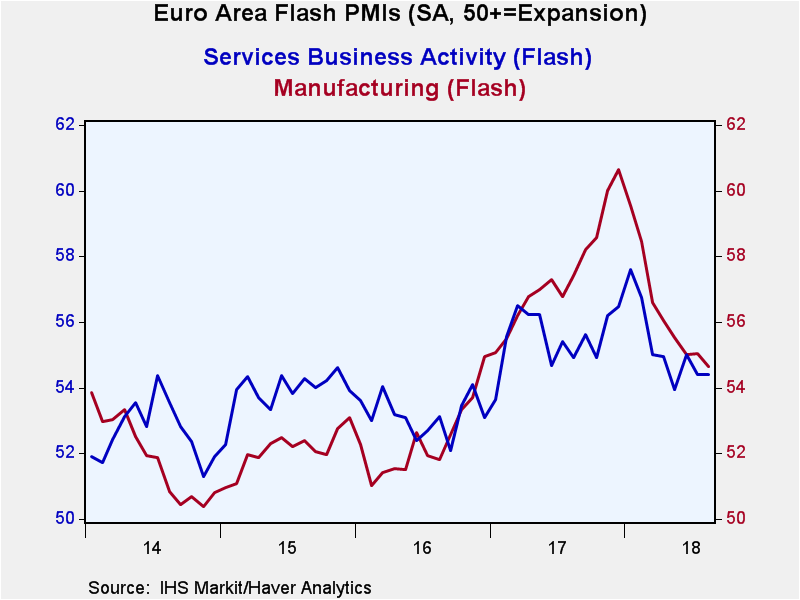 Global| Aug 23 2018
Global| Aug 23 2018EMU Flash PMIs Stabilize
Summary
The EMU PMIs have been falling over the last six months, but in August the indexes are stabilizing on very minor technical rebounds. The EMU manufacturing PMI fell to 54.6 in August from 55.1 in July as the services PMI posted a [...]
 The EMU PMIs have been falling over the last six months, but in August the indexes are stabilizing on very minor technical rebounds. The EMU manufacturing PMI fell to 54.6 in August from 55.1 in July as the services PMI posted a modest gain to 54.4 from 54.2. This combination of events took the overall EMU PMI higher to 54.4 in August from 54.3 in July. The moving averages show a continuing loss in momentum from 12-month to six-month to three-month.
The EMU PMIs have been falling over the last six months, but in August the indexes are stabilizing on very minor technical rebounds. The EMU manufacturing PMI fell to 54.6 in August from 55.1 in July as the services PMI posted a modest gain to 54.4 from 54.2. This combination of events took the overall EMU PMI higher to 54.4 in August from 54.3 in July. The moving averages show a continuing loss in momentum from 12-month to six-month to three-month.
The PMIs are now sitting at a relatively modest level. The queue standing for the EMU composite index is in its 69.6 percentile comprised of a 62.5 percentile standing for manufacturing and a 66.1 percentile standing for services.
Germany and France each have a 69.6 percentile standing for their respective composite indexes. German has manufacturing and services PMIs that have mid-sixtieth percentile standings. France has a mid-seventieth percentile standings for its sectors individually that translates to a composite standing in its 69.6 percentile. These are solid readings for Germany, France and for the EMU but are nowhere near as strong as the readings they had been sporting about six months ago. The slowing in the EMU is clear. But it is not clear if the slowing is over or not. Certainly, the PMIs at current values give no reason for concern about growth. There has been a slowdown but there is still plenty of growth left, according to current PMI signaling.
Japan shows a slight manufacturing PMI gain in August against a legacy of slowing PMI averages over the past year from 12-month to six-month to three-month.
The U.S. flash PMIs from Markit also show modest slowing in July and August, reversing a 12-month to six-month to three-month series of gains in the PMI moving averages. The U.S. PMIs find that the sector and headlines have queue standings from the 57th to 60th percentiles. These are both firm but modest readings.
The U.S. and EMU show manufacturing sector PMI slippage, so does Germany. France has logged a manufacturing improvement along with Japan. This means that the evidence of trade disruption is fragmented and far from clear. There are increasing concerns that trade actions are going to disrupt output and growth. A recent poll of economists taken by the news service, Reuters, looks for growth disruptions as a result of trade actions. But clear and convincing evidence of adverse trade effects remains elusive. It may just be too soon.
Robert Brusca
AuthorMore in Author Profile »Robert A. Brusca is Chief Economist of Fact and Opinion Economics, a consulting firm he founded in Manhattan. He has been an economist on Wall Street for over 25 years. He has visited central banking and large institutional clients in over 30 countries in his career as an economist. Mr. Brusca was a Divisional Research Chief at the Federal Reserve Bank of NY (Chief of the International Financial markets Division), a Fed Watcher at Irving Trust and Chief Economist at Nikko Securities International. He is widely quoted and appears in various media. Mr. Brusca holds an MA and Ph.D. in economics from Michigan State University and a BA in Economics from the University of Michigan. His research pursues his strong interests in non aligned policy economics as well as international economics. FAO Economics’ research targets investors to assist them in making better investment decisions in stocks, bonds and in a variety of international assets. The company does not manage money and has no conflicts in giving economic advice.
More Economy in Brief
 Global| Feb 05 2026
Global| Feb 05 2026Charts of the Week: Balanced Policy, Resilient Data and AI Narratives
by:Andrew Cates






